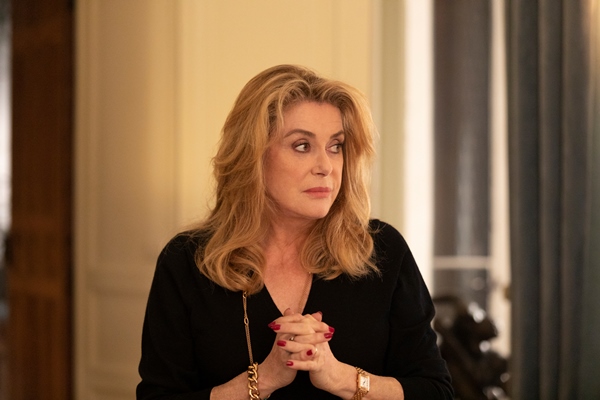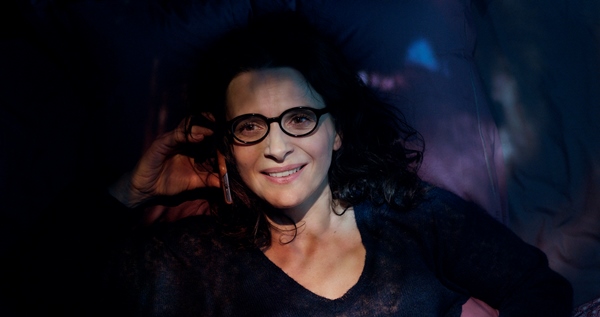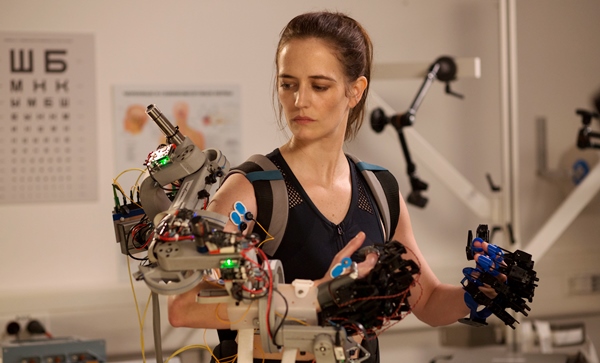
Year in and year out, New York’s Rendez-Vous with French Cinema showcases recent star vehicles for France’s leading actresses. During its first week, Juliette Binoche was the festival’s secret sauce, appearing in the opening night selection, The Truth, and steering a twisty, brainy, playful riddle, Who You Think I Am. Like all events that take place at Lincoln Center for the Performing Arts, the festival was cut short three days early in response to the spread of the coronavirus (COVID-19) in the city.
Both New Yorkers and Francophile filmgoers outside of New York City will have an opportunity to see the following movies, which screened earlier in the lineup. These are among a bumper crop of movies that will come down the pike in theaters or streaming platforms later this year.
Writer/director Hirokazu Kore-eda (Shoplifters) makes his first foray outside of his native Japan in the ultimately lighter-than-air The Truth. The director’s work has revolved around the give and take within families, biological or makeshift, and he returns to familial resentments, recriminations, and reconciliations.
His newest film takes place within an upper-class, artistic milieu where the banter comes forth in a more imperious key, thanks to the haughty, controlling, and withholding main protagonist. However, the biggest departure for Kore-eda isn’t the setting but the script, where members of the household baldly state their wants and needs. Everyone lays everything on the line. This family would be terrible at cards: they are not good at hiding their thoughts.
Film star Fabienne (Catherine Deneuve) has just written her autobiography, and her film editor daughter, Lumir (Binoche), flies thousands of miles across the Atlantic to read the manuscript. (If mère had just emailed her work, there wouldn’t be a movie.) Lumir’s memory and her interpretation of their shared past diverges considerably with Fabienne’s heavily circumspect account. For example, Fabienne has completely omitted any mention of her longtime assistant, who quits in a huff and leaves Lumir responsible for getting Fabienne on time to her latest project, a sci-fi mother-and-daughter drama. (Its time-travelling plot actually feels more intriguing and thoughtful then the main event between Fabienne and Lumir.) Coming along for the fraught reunion are Lumir’s playful and observant young daughter and her B-actor husband, played by Ethan Hawke.
Playing the grande dame to the hilt, Deneuve has the flashier role. Kore-eda has tailor-made the part for the actress, and it doesn’t exactly dismantle Deneuve’s ice princess persona. Additionally, Fabienne’s acting resume reads as a valentine to Deneuve’s filmography, with such titles as The Belle of Paris (think Belle du jour). Yet it’s Binoche who makes the film matter. Her reactions are not as predictable as the dialogue as she tries to get her mother to understand her point of view through mockery, confrontation, and humor. She’s at once exasperated but also admiring of a mother who has still maintained a long artistic career.
The Truth, originally scheduled to open on March 20, will be released during the summer instead.

Based on Camille Laurens’s best seller, Safy Nebbou’s psychological thriller Who You Think I Am strips layers off of calculating Claire Millaud (Binoche again), a narcissist fueled by entitlement and anger. Recently divorced, she’s a French literature professor and the mother of two well-behaved boys, and maintains an active sex life with a guy half her age. No reticent intellectual, she and Ludo (Guillaume Gouix) have sex in front of a floor-to-ceiling window (it’s not quite Shame-ful—the lights are off). But the relationship stays strictly in the bedroom; he knows she won’t introduce him to her sons, and she’s aware that he’s too embarrassed to introduce her to his friends. When she voices her disappointment when he cancels plans, he scoffs at her pouting: “You’re too old for that.”
He immediately ghosts her, while she resorts to catfishing, making up a fake social media profile to keep tabs on him. She plans to reenter Ludo’s life through connecting with one of his friends, Alex (Francois Civil, this year’s It star of the festival; he also appears in Someone, Somewhere). Online, she becomes Clara, a fashion publicist intern in her early 20s. As a result, she begins living for and thriving on the likes and replies from her new beau, Alex, whether she’s in front of hundreds of students or on the toilet. If it weren’t for her lying, Claire’s newfound bliss would be the best advertisement for Tinder. She remarkably maintains the masquerade for weeks on end, until Alex insists on finally meeting her face to face.
Not all of the twists may be believable or credible to viewers, but that is not what’s crucial. The plot’s puzzle pieces fall into place based on what Claire thinks—if information confirms her ideas—or delusions. The film suggests that the professor’s real role model is none other than Henry Ibsen’s Nora from A Doll’s House, about whom Claire lectures to her students as a new sort of rules breaking woman. However, one aspect of Nora that Claire conveniently ignores is Nora’s brutal honesty, especially toward herself.
Who You Think I Am is scheduled to be released on August.

One of the best films in the series will be widely available later this year on Netflix, An Easy Girl, a steely-eyed coming-of-ager that mixes class, race, and sex. Set during a lazy summer, the story line convincingly meanders on a tightrope.
Filmmaker Rebecca Zlotowski takes you to the other side of the tracks of Cannes, far away from the Croisette and the familiar Mediterranean scenery frequented by filmmakers and flaneurs. However, there are still sights to behold, such as the opening wide shot of a remote cove where Sofia (the uninhibited Zahia Dehar) emerges Venus-like from the turquoise sea, wearing nothing but the bottom half of her green bikini, her body in full to display.
The film opens with a quote by jack-of all-trades Blaise Pascal, “The most important thing in life is to choose a profession.” However, it leaves out the rest of the philosopher’s statement: “Chance arranges for that,” as though the cards have already been dealt. The tacit question hovering throughout is, in fact, the destiny, or perhaps the predestination, of two young French woman of North African background, Sofia and her cousin Naïma (the quietly compelling Mina Farid).
At the beginning of 16-year-old Naïma’s summer holiday, Sofia suddenly arrives from Paris to crash with her relatives, and she brings Naïma along on her coastal and nightclubbing adventures, which includes rich men and yachts, champagne, and not an inconsiderable amount of cocaine. The cousins taste the glamorous life and the gut-punch hangover the morning after.
No one is quite sure how Sofia makes a living—she never carries money—but on a day-to-day basis, she seduces with charm. The seduced include Naïma, who becomes fascinated by Sofia, both by her bling (a white Chanel purse) and by how readily men hover for her attention.
Fiercely independent, at least outwardly, Sofia knows what she wants and she knows how she can get it while she can. The 21-year-old has already undergone cosmetic tweaking and buffing,with pouty lips, a voluptuous figure, and the perma-tan look of the day. She sports a “carpe diem” tattooed on her hip and lives by the motto. When she’s with her cousin, she drops her party girl mask, and mingling with others, she withstands put-downs and rejections with unflappable ease.
If Sofia is an exaggerated, hyper-feminized version of a Holly Golightly on the prowl, then the soft-spoken, more observant Naïma is her captivated audience, willing to be groomed. In some ways, the younger teenager is a tabula rasa out of a young adult novel who doesn’t always know her own best interests
The soundtrack caters more toward an older audience—Schubert’s “Hungarian Melody” and Chet Baker’s “The Touch of Your Lips.” But its target audience, younger viewers, will hopefully discover this perceptive, empathetic film when it streams on Netflix. An Easy Girl joins previous Rendez-Vous selections that feature contradictory, determined young women in smart films, such as Ava (2017), The Stopover (2016), and Parisienne (2015)

Director Alice Winocour has given Eva Green her own star vehicle, a vigorous, modern-day woman’s picture, a genre descriptor used here as a term of endearment: Proxima. For all of the technical bells and whistles in the background, the script squarely centers on “domestic concerns” (to quote Jo from the latest Little Women reincarnation), here the career and family demands of a single mother who thrives in a rarefied occupation.
Winocour takes a straightforward and grounded approach into the private life of Sarah (Green) in the literally high-flying, competitive world of space exploration: the divorced mother has been chosen as a replacement for a mission to Mars. Yet the tone is more lo-fi than sci-fi. Winocour centers the movie on Sarah’s relationship with her eight-year-old daughter, given the too-fitting name of Stella (Zélie Boulant). Training in remote Russia takes Sarah away months at a time before she has to be quarantined, and her fears that their bond is on tenterhooks are confirmed when Stella refuses to speak French, her mom’s native language, on the phone and instead chatters in her dad’s German.
Sarah’s training scenes are as visceral and methodical as those in First Man. She’s in an environment where she has to prove herself to gain loyalty from her male colleagues; she discovers an expedient way to connect is by covering up for swaggering American astronaut Mike (Matt Dillon) when he falters. Despite the va-va-voom of rockets and the boisterous testosterone among the men, the film’s tone is quiet and contemplative.
The movie is not necessarily lighter than gravity, but the acting is strong enough to withstand too writerly declarations, like Mike’s “There’s no such thing as a perfect astronaut, just as there’s no such thing as a perfect mother.” Fortunately, the action moves forward more so from Green’s reactions then the dialogue.
Proxima is scheduled to be released by Vertical Entertainment later this year.






Leave A Comment